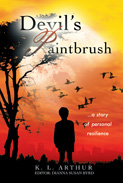
 |
The stark reality of Ken Callahan's life is portrayed with honest conviction in K.L. Arthur's novel. Ken grows up as a serious young boy in the projects of Brooklyn, Maryland. Life in the streets of south Baltimore is difficult where he quietly suffers the abuse of his hard-smoking mother, while enduring physical torment from his older brothers and the kids at school. Ken is simply an easy target for everyone. He finds inspiration from movies and television and seeks help from the few adults he can trust, learning to initiate survival tactics where needed.
After graduating from high school, Ken joins the US Army at the age of eighteen. Thus begins his new life in the armed forces, and in March of 1968, he finds himself in the midst of the sweltering heat and brutal environment of Vietnam. His self-esteem rises and falls, paranoia sets in, and he becomes isolated from everyone around him. For a while, a saving grace is the letters from his fiancé, which he dubs an "anecdote to the virus called Vietnam." Then the letters suddenly stop. His connection to the outside world lost, and Ken increasingly falls into despair and the comfort of drugs.
Even life after Vietnam remains a constant battle for Ken. Failed marriages and relationships plague him as he continues his career in the US Army. Then the discovery of his post-traumatic stress disorder changes everything, and a new awareness of himself emerges. With the support and love of his fourth wife, Dawn, Ken navigates the uncharted waters of PTSD, connecting with other veterans and professionals experiencing and learning about the condition. Through all of this, Ken empowers himself to confront the haunting memories of his youth and Vietnam buried within him.
Arthur's thinly veiled fictional account is an important work in the continuing efforts to understand and help veterans suffering from PTSD. The novel's title refers to a flowering plant called Devil's Paintbrush, known for its resiliency and ability to withstand any environment. Like the Devil's Paintbrush, Ken is able to persevere through his harsh childhood, the brutality of the Vietnam war, and the ongoing difficulties he faces in life afterwards. We understand and appreciate the author's personal attempt to overcome his struggle with PTSD and the great sacrifices that are made by those who serve.